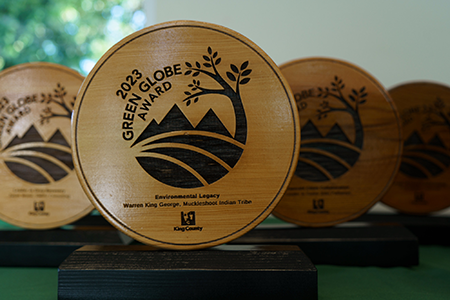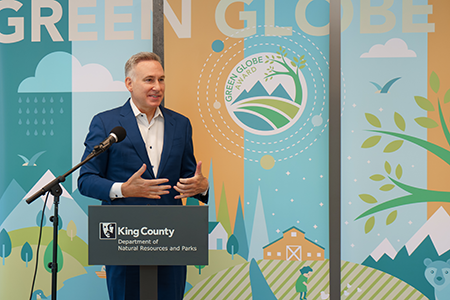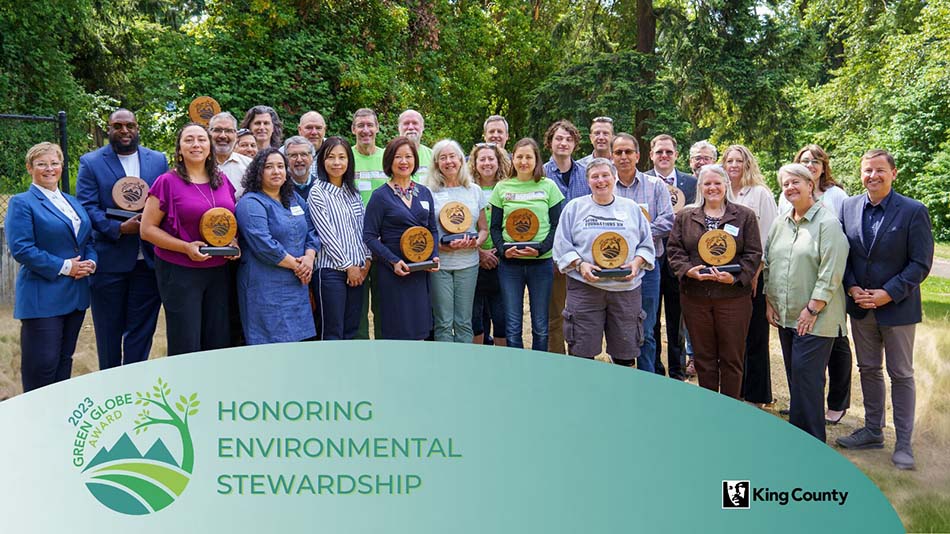Executive Constantine announces winners of the 2023 Green Globe Award – King County’s highest honor for environmental stewardship
Summary
Eleven individuals and organizations from across King County were honored by Executive Dow Constantine and the King County Department of Natural Resources and Parks with a 2023 Green Globe Award for outstanding work to protect and restore the environment, and contributing to a more resilient, sustainable, more equitable King County.
Story
King County Executive Dow Constantine led a celebration in White Center this week honoring the 2023 winners of the Green Globe Award – the region’s highest recognition for environmental stewardship.
This year’s 11 award winners include a company that carefully deconstructs buildings to put lumber back into the economy, an organization whose highly efficient approach to building tiny homes for people experiencing homelessness minimizes waste, a collective that improves the health of Black communities by strengthening the local food economy, and a pioneering land conservation advocate who helped protect 120,000 acres of open space.
“Each of these Green Globe Award winners is shaping a better future for our region by producing lasting results for the people, fish, and wildlife that live in this spectacular corner of the country,” said Executive Constantine. “Their inspiring achievements contribute to a more resilient, more sustainable, more equitable King County.”
2023 King County Green Globe Award Winners
Environmental Catalyst Award: Terry Lavender
The top honor – The Environmental Catalyst Award – went to longtime open space preservation advocate Terry Lavender, who has served on the Conservation Futures Advisory Committee for nearly two decades. Under her guidance, Conservation Futures generated more than $300 million in funding for more than 350 projects that protected 120,000 acres of open space.
Lavender has been an environmental leader in King County for more than three decades. Starting in the 1980s, she helped protect a fragile upper Bear Creek wetland near Redmond – one of the most productive salmon habitats in the Central Puget Sound region – from development. Since then, Lavender has been an advocate for open space and land conservation, helping protect forests, trails, river corridors, farmland, natural areas, and urban greenspace throughout King County.
Environmental Legacy: Warren King George, Muckleshoot Indian Tribe
Warren King George, oral historian for the Muckleshoot Indian Tribal Preservation Department, was presented with the Environmental Legacy Award for providing his invaluable perspective over the years on protecting and integrating Tribal cultural legacy, traditional knowledge, and utilizing cultural resources in contemporary project decision-making. His oral history projects range from hunting, fishing, and clamming stories on the Puget Sound, to berry picking trips in the Cascade Mountains.
King George applies his knowledge by coordinating with government agencies to ensure Tribal members have access to their treaty-protected resources and that management plans provide for the preservation and enhancement of the Tribe’s valuable cultural resources. King George offers King County a unique perspective from the Tribe’s deep history in this place and the related traditional ecological knowledge derived from it. This shared knowledge helps the county integrate the Tribe’s traditional cultural practices with contemporary science and technology toward restoring impacted natural resources effectively and appropriately for all people in King County.
Leader in Green Building: Sledge Seattle, LLC
Sledge Seattle, LLC is a team of harvesters that rescues wood and other materials from homes destined to be demolished and thrown away. Jim Barger and John Benavente specialize in the careful deconstruction of homes, buildings, and commercial structures across King County in the most environmentally responsible way possible.
Sledge Seattle has repeatedly demonstrated the viability of a short-loop circular economy for salvaged lumber. The lumber harvested from deconstruction projects is then used as lumber for new, more affordable housing units including backyard homes known as DADUs and tiny houses.
Leader in Affordable Green Housing: Sound Foundations NW
The goal of Sound Foundations NW is to be a part of the solution to end homelessness in King County by building transitional tiny homes inside a warehouse in South Seattle called “The Hope Factory,” a 100% recyclable facility. Many of the scraps are repurposed for other uses in the home, reducing the amount of wasted materials and the greenhouse gas emissions needed to manufacture it.
The organization then works with the Low Income Housing Institute, which sets up villages for the tiny homes and their new occupants. Three people per year transition into a tiny home and then out to a better life. Because their homes are built to last for 20 years, one Sound Foundations NW tiny home has the potential to help up to 60 people.
Leader in Waste Reduction: Refugee Artisan Initiative
Ming-Ming Tung-Edelman founded Refugee Artisan Initiative, which for six years has partnered with refugee and immigrant women to foster an inclusive, prosperous transition to the United States through artisan skills training and micro business development. They do this by upcycling textiles and other materials.
The sewing projects provide refugee women with meaningful income and work while also preventing waste. The organization has diverted more than 40,000 pounds of materials out of landfill by upcycling them into 120,000 items while creating jobs for more than 40 refugee and immigrant women.
Leader in Local Food Economy: Black Farmers Collective
The Black Farmers Collective is a group of urban food system activists working to improve the health of Black communities through food justice and sovereignty. Their mission is to build a Black-led network of food system actors to acquire and steward land, facilitate food education, and create space for Black liberation in healing and joy.
The Black Farmers Collective runs two urban farms, Yes Farm on Yesler Way in Seattle and Small Axe Farm along the Sammamish River between Redmond and Woodinville, on land leased from King County’s Farmland Preservation Program. These farms not only grow food for local communities but are incubators for BIPOC farmers who are interested in training and learning about farming and creating sustainable farm businesses.
Leader in Green Jobs Pathways: Emerald Cities Collaborative
The Emerald Cities Collaborative pursues a “high-road” approach to greening cities and building resilient regional economies. By creating cross-sector collaborations, acutely focused on those historically left out of the economic and community development process, they help communities increase their capacity to build high-road economies that are more sustainable and economically just.
In King County, Emerald Cities Collaborative offers a variety of support services to minority and women-owned contractors seeking to grow their business and interested in clean energy projects. Services include their flagship program, E-Contractor Academy, as well as customized business consulting, matchmaking, and workshops on contracting and sustainable building topics.
Leader in Community Resiliency: Snoqualmie Valley Fish Farm Flood Implementation Oversight Committee
King County is committed to protecting and enhancing farmland, restoring threatened salmon and associated habitat, and reducing flood risks to residents and infrastructure. However, balancing these critical priorities can be challenging in a shared landscape. That’s where the Fish, Farm and Flood Oversight Committee comes in and works to achieve the goals of these sometimes-competing priorities.
Over five years, the committee of farmers, fishers, tribes, and agencies has helped sustain implementation efforts of more than 42 recommendations and uses a consensus model to make progress where fish, farm, and flood interests collide in the valley, ensuring progress in all three categories.
The committee’s accomplishments include completing an innovative drainage pilot project along Griffin Creek, working to implement a community-led Agricultural Strategic Plan, and developing the largest county habitat restoration project to date – the Snoqualmie at Fall City Reach Project— which restores 130 acres of habitat.
Leader in Orca Recovery: Jason Wood, SMRU Consulting
SMRU Consulting conducts marine mammal research worldwide. In Puget Sound, their experts are measuring underwater noise from commercial and recreational vessels that pose multiple risks to southern resident orcas, aboard the King County Department of Natural Resources and Parks' research vessel, SoundGuardian.
The pro-bono study is helping increase the frequency and quality of reports of orca sightings provided to pilots of large vessels so they can voluntarily slow down or change course, reducing the amount of underway noise and preventing collisions. Orcas rely on their use of sound to hunt, communicate, navigate, and avoid danger, which can be limited by noise generated from maritime activities.
Leader in Forest Stewardship: Kevin Zobrist and Washington State University Extension Forestry
Professor Kevin Zobrist and his program staff at Washington State University Extension Forestry Program provide objective, research-based education, and resources for landowners with a wide range of property types from small “backyard forests” to larger forested properties and tree farms. Despite its urban reputation, King County has one of the highest numbers of small forest landowners in the state.
The program partners with King County, King Conservation District, and the Washington State Department of Natural Resources to provide the most important education and training platform for private forest landowners in the County. The program directly leads to protection and improved management of thousands of acres across the landscape.
Leader in Environmental Excellence: Sno-King Watershed Council
Sno-King Watershed Council is an all-volunteer organization working together to protect streams, watersheds, and natural areas for the health and quality of life for people in the region. They focus on water quality and community engagement through water quality monitoring and related activities.
The Council promotes stewardship of local streams, awareness of water quality issues, and provides outreach and education. It partners with and provides training to local environmental, education, and youth organizations, community groups, and schools. Sno-King also has a long history of advocacy, working to protect and preserve natural areas threatened by land development.
Photos
Relevant links
- 2023 Green Globe Award winners
- PHOTO GALLERY: Award ceremony for 2023 Green Globe Award winners
- VIDEO: Watch the 2023 Green Globe Award ceremony
- TRACKS: An interactive map of environmental stewardship in King County
Quotes
Each of these Green Globe Award winners is shaping a better future for our region by producing lasting results for the people, fish, and wildlife that live in this spectacular corner of the country. Their inspiring achievements contribute to a more resilient, more sustainable, more equitable King County.
The Green Globes demonstrate that the people of King County will use ingenuity and innovation in ways that protect the natural environment and contribute to the quality of life we enjoy today. We should all continue to work together to ensure a more sustainable, resilient future for our region.
The Green Globe Award winners inspire hope by demonstrating that the people, nonprofits, and businesses of King County can produce measurable results for the natural environment that defines our region. Their successes complement the work our employees do each day to uphold our shared commitment to environmental stewardship.
For more information, contact:
Doug Williams, Department of Natural Resources and Parks, 206-477-4543

 Translate
Translate


